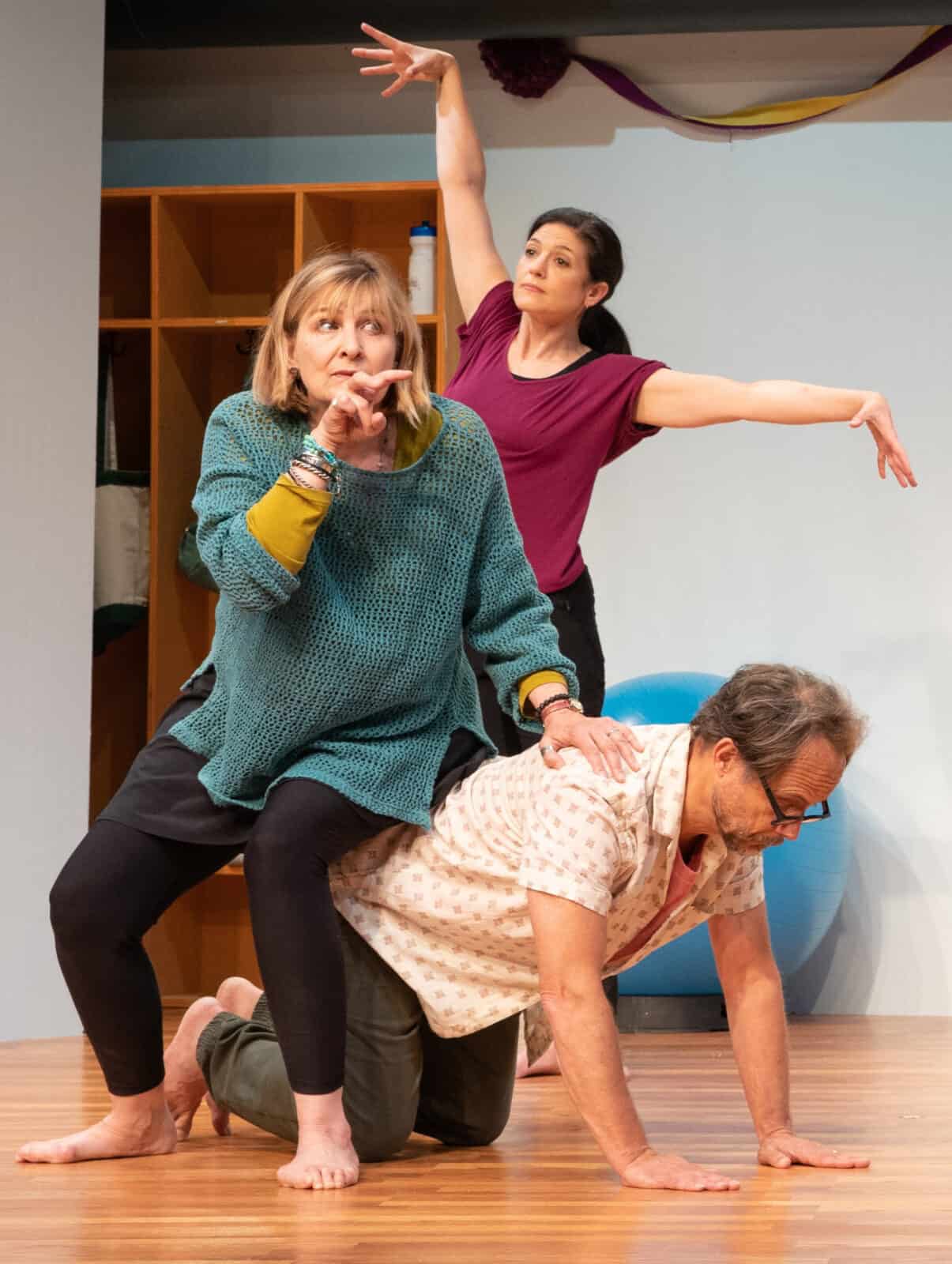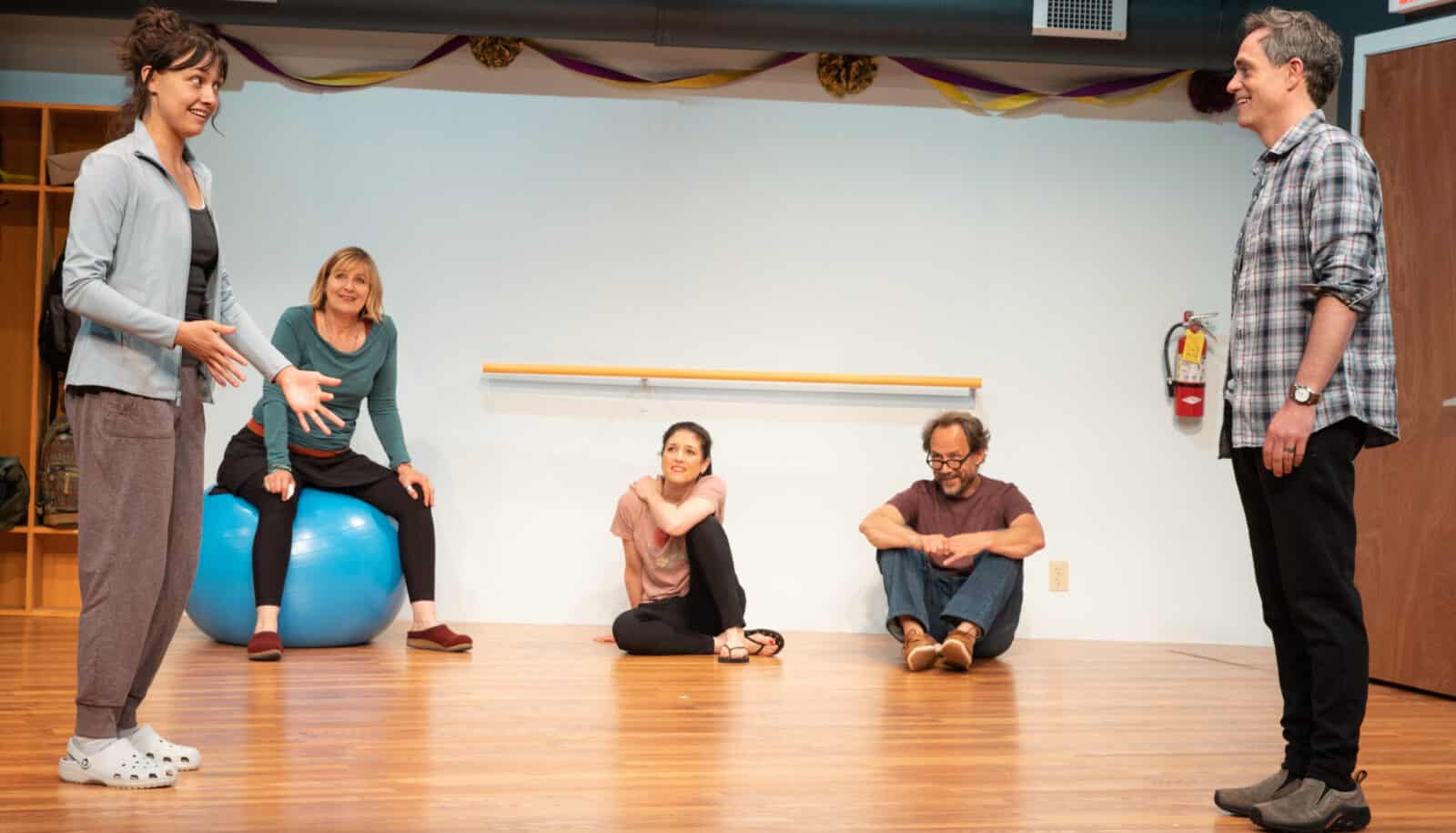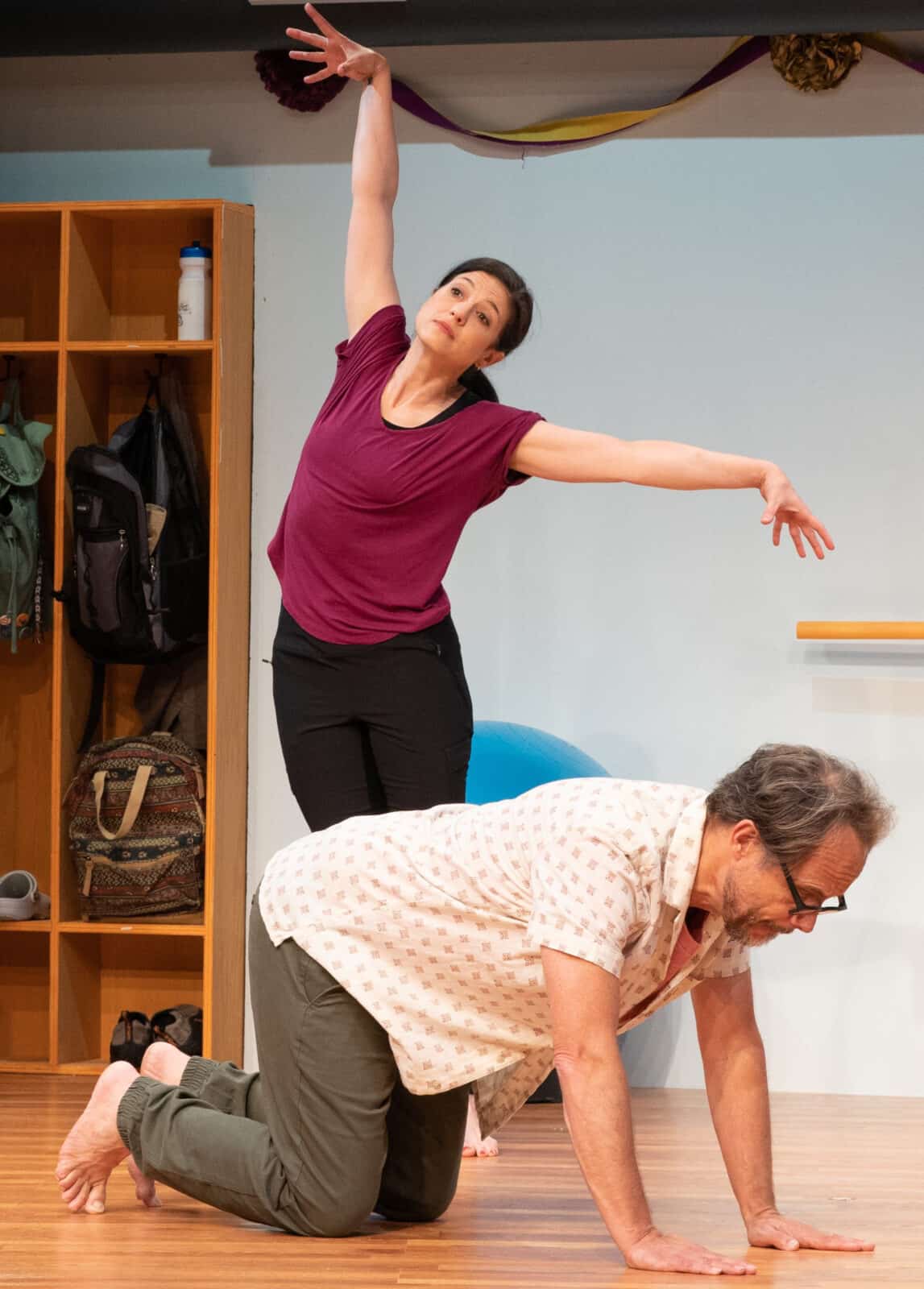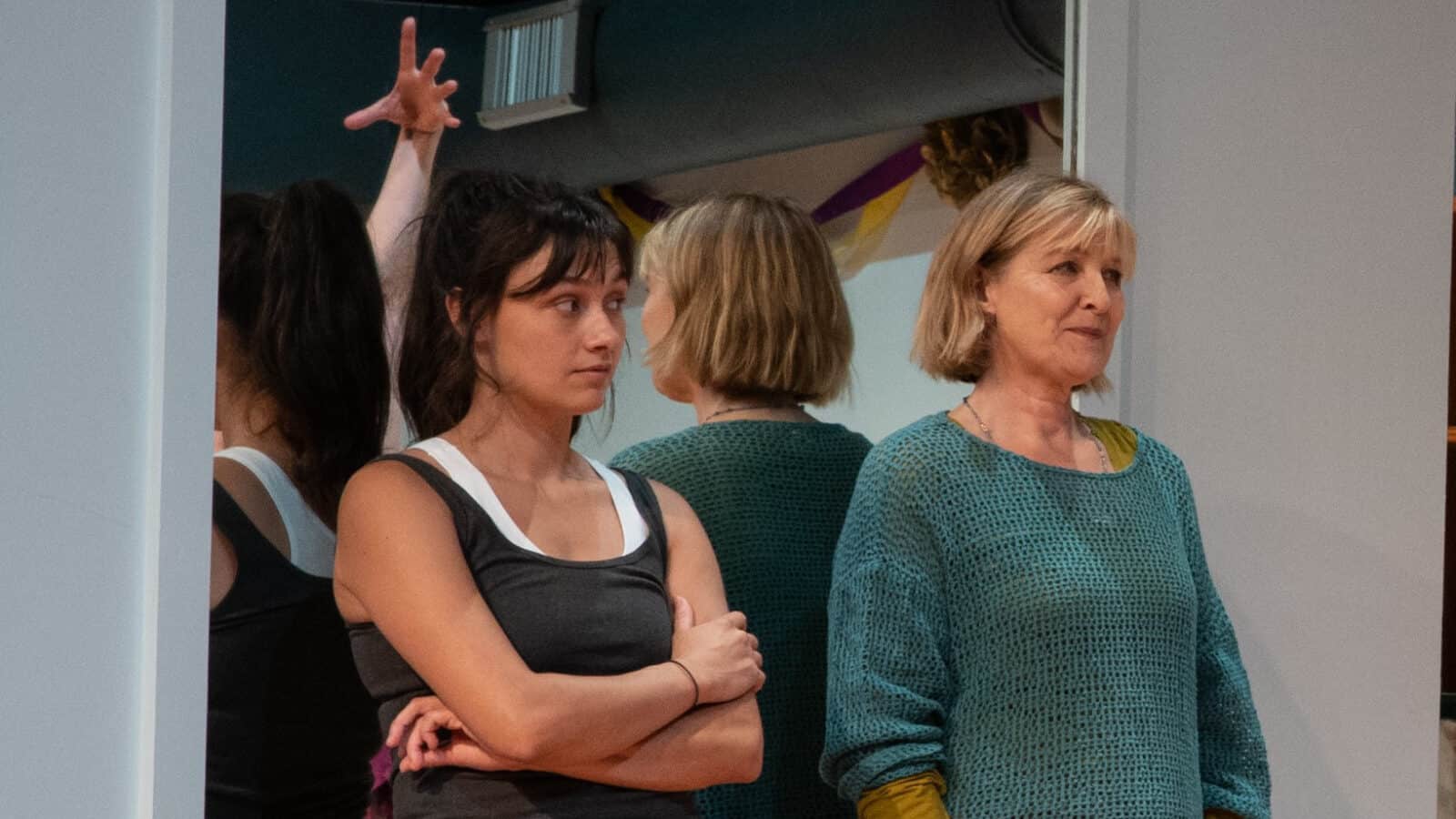It’s a quiet, sunny morning, and a handful of people are sitting in a bare room at a community center. It’s a clean and ramshackle room in a small town, the kind of place built and maintained on a shoestring, a place that can be everything or nothing — depending on the people who walk in.
And in the premise, in the opening, this space can be anything. These five people are meeting for an adult community acting class. They have a chance to move and change in a creative place — as surely as we are in one here, in Circle Mirror Transformation, Chester Theatre’s final play of the summer season.

Tara Franklin as Theresa, Corrina May as Marty and Alex Draper as James improvise in a community acting class in Annie Baker's 'Circle mirror transformation.' Press photo courtesy of Chester Theatre.
The name suggests a longing for that kind of creative space, and in Annie Baker’s sure ear for contemporary language, she can argue that each of the characters shares it. In Alex Draper’s words as James, I’m afraid I’m blocked in my life.
‘In the action as it plays out, what we are really seeing here is a tragedy of lack of transformation.’
But here, in the action as it plays out, what we are really seeing here is a tragedy of lack of transformation.
That tragedy is beautifully and powerfully acted — Corrina May as Marty, Joel Ripka as Schultz, Chester Theatre’s co-director Tara Franklin as Theresa and Hero Marguerite as Lauren — interweave their lives with nuance and humor. Five people come into a room alone and afraid, wanting an energy and connection in their lives, a sense of purpose and intimacy that most of them may not even have words for.
In Tara Franklin and James Barry’s first summer as co-directors, in shows like Loy A. Webb’s luminous and loving exploration of The Light and Rajiv Joseph’s incisive Guards at the Taj, they seem to be exploring a powerful through-line of responsibility — an understanding that love means caring for someone else as fundamentally as it means real confidence in yourself.
An acting class can give room for that kind of understanding. People can create a space between themselves to play, to be inventive and unexpected, to imagine different worlds. They can make a space to open up in new ways, to other people, and maybe most fundamentally to themselves.
If they choose, this room can be a place for honesty, for revealing hard truths and moving through them, for releasing energy and facing life with renewed excitement and strength. We see the first trembling shifts in possibility, as each character finds a moment of that kind of honesty.
Tara Franklin may come closest to a confrontation with herself. As a brilliant, charismatic and vulnerable Teresa, she offers experiences only too painfully timely today. She is causing herself harm by getting into relationships with men who treat her with absolute contempt, who deny her humanity and creativity and independence — out of their own fear.
Her imagined debate with her abusive ex is a triumph, and her denunciation rings in the air across the national debates we are facing right now — This has nothing to do with love. If you cared about me, you’d want me to feel optimistic about the future.

Hero Marguerite as Lauren and Joel Ripka as Schultz meet in a community acting class in Annie Baker's 'Circle mirror transformation.' Press photo courtesy of Chester Theatre.
She is going to struggle with this cycle again, even as she identifies it clearly for herself and for us. And Corinna May as Marty, the teacher of the class, will struggle with her own refraction of that conflict. May plays Marty with clarity and vigor as a creative woman looking for release. Like Teresa — she has been hurt, and she has stayed in situations that are causing her pain because she does not want to be alone.
Marty wants color in her life, she wants creativity and drive and desire. She is afraid of them, and she wants the energy and intimacy and vivid contact of theater. She is trying to take the first steps, in setting up this space, in trying to bring other people in, and she is vulnerable here in ways we will only begin to understand.
Her husband doesn’t — Alex Draper as James gives a pitch-perfect and frighteningly realistic portrayal of the guy who is avoiding all of his own problems and fears and blaming them on everyone close to him — taking out his anger on people who are vulnerable. From the first scene, he’s dodging his assignments. Marty has asked each person in the group to say something about themselves, and he tries to speak from her point of view. In his tone and defensiveness, Draper makes devastatingly clear that James is not acting out of empathy — he is deliberately undermining her and ridiculing her first exercise with this new class — because honesty scares him.

Tara Franklin as Theresa and Alex Draper as James improvise in a community acting class in Annie Baker's 'Circle mirror transformation.' Press photo courtesy of Chester Theatre.
This is a pattern that will persist. And it is the kind of pattern this class and this kind of creative place can potentially change. Creativity can act as a mirror, showing someone the world around them and themselves in new ways. If they respond with honesty, they can connect with each other, overcome fear, find new kinds of energy.
‘Theater especially, as a creative source, can mean creating together. In this room, games and improvisations can give ways in to difficult conversations.’
Theater especially, as a creative source, can mean creating together. In this room, games and improvisations can give ways in to difficult conversations. Marty confronts James through an exercise, pulling him to talk, and for a span of 30 seconds, he answers and gives her his full attention.
Baker alights on these moments of first connection … when Schultz has a quick few words with Marty and intuits some of the pain she carries … when Lauren, the one teenager in this roomful of middle-agers, reveals that her father is Lebanese, and she barely brushes what that might mean for him and for her in the early 2000s, not long after 9/11.
But she is not really willing to talk about it. And this too becomes a pattern. The conversation touches down at a point of honesty. Real feeling comes into the room. And this is where the circle in the name could come in, because in order to have real change, you need to hear and see what you’ve just learned, sit with it awhile, understand it and act on it.
Transformation is not easy — and a circle can help to hold someone while they take the time they need to make the change. While they deal with past pain, while they hold an honest conversation with themselves and anyone else, while they are still in the first raw steps of metamorphosis, friends can help to hold them together.
If this group acted as a circle, they might help someone hold that kind of awareness. If they gathered around the person who has just come to a moment of clarity and vulnerability, they might help to make the transformation.
If you want real transformation, this is where the conversation has to begin. But we only see it end.
From the play’s name, that’s what I was looking for … But that’s not how it plays out. Over and again, someone dips a foot into the shallows, a conversation or a theater game touches something real — and then someone else walks into the room, the lights go out and the scene changes, everyone says that was intense and lets it go.
Or they make the same painful mistake again, and harder, because they now know clearly that they could have made other choices. When Marty gets through to James for half a minute, she helps him put into words real fears, of being blocked, of losing touch with people he loves. But she doesn’t ask him why, and he doesn’t tell her.
If you want real transformation, this is where the conversation has to begin. But we only see it end. None of these first connections have a chance to grow. The drama escalates in the other direction. James will lash out instead, in a selfish and manipulative move that will publicly humiliate everyone else in the room.
So I walked out into the afternoon sun again with intense respect for the cast and with intense sadness. The language is deft, their characters intensely realistic and their exchanges often humorous. But I came in wanting metamorphosis, and instead I’m seeing creative potential being destroyed. In today’s world, that’s a hard reminder, and it’s not where I want the story to end.

